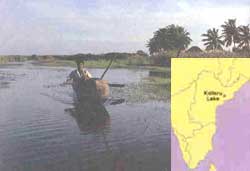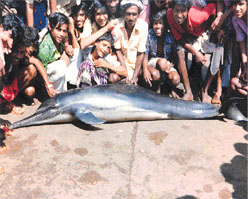
The victims of vanity
The culture of `businesslike" individual enterprise is playing havoc with the age-old collective wisdom of communities that plan for the common good

The culture of `businesslike" individual enterprise is playing havoc with the age-old collective wisdom of communities that plan for the common good

A pristine lake that once drew birds of several species today lies clogged with weeds, a victim of unplanned economic development.

Sandalwood smuggling, epitomised by Veerappan, has become a collective phenomenon involving entire villages, which even the ban on sandalwood exports has been unable to curb. Deregulation of the sandal tree, currently under state control, is now being deb
Although small hydro electric schemes are considered ideal for remote hill villages, planners have overlooked crucial factors and not all villagers are happy

The world over, the pockets where the poor live are used as environmental dumps. PAUL WAPNER debates the environmental ethics of International politics
India's attempts at developing supercomputers have not only paid off, they have sparked intense competition.

Where the government has failed miserably in providing quality service to the people, some ngos have set an example on how urban waste can be managed. Vatavaran in Delhi and Exnora in Chennai are two organisations, which have set at rest doubts on the dif

The killing of tigers and of forest guards in Ranthambore is the result of a conservation strategy that took away the rights of the local people and made them willing allies of poachers.

Dolphins, the most playful and beguiling mammals of water, are on the verge of extinction. Awareness programmes will go a long way in preserving the species

After the proposed Nylon 6,6 plant in Goa was discussed threadbare and opposed by many, the Greens succeeded in having the project shifted out

The most powerful government in the world and the behemoth tobacco industry are waging a ding-dong battle over...well, cigarettes

In its bid to get out of poverty, the Bihar government has finalised a plan to drain out lakes and convert them to farmlands. But it seems to be unaware of the ecological consequences of such moves.

Environmental degradation, changing land use patterns and poor administrative planning is resulting in the destruction of a unique agro system in Goa.
Attempts at conserving fruit germplasm as well as creating a market for lesser-known varieties have been far from satisfactory. Also, a whole lot of fruits are yet to be sampled

The Union environment minister says that a comprehensive bill to protect India"s biodiversity is on the anvil. But whether it can be a timely, effective measure that give farmers and tribals right over their biological knowledge, remains to be seen.
<p>One of the eight Missions under India's National Action Plan on Climate Change, the <a href="http://moef.nic.in/downloads/public-information/GIM-Report-PMCCC.pdf"><strong>revised National Mission for a Green India (GIM for short)</strong></a> professes responding to climate change by a combination of adaptation and mitigation measures, which would help:</p>

The Thar of Pakistan is an arid region troubled by long spells of drought, rapidly falling groundwater levels, abysmally low literacy levels and rudimentary medical centres. But the crisis facing the Thar today stems from beyond all this. It can be traced

India is one of the few developing countries to have its own space satellite systems. And, now Indian planners are depending increasingly on remote sensing for resource mapping and the monitoring of natural disasters.
People collect rainwater without any support from the government. This saves the avoidable overuse of drinking water

Pollinators, small insects like bees and butterflies, animals like bats and small birds such as the hummingbird, play a big role in helping plants propagate. Their populations are declining rapidly. If they die out, so will the plants that depend on them